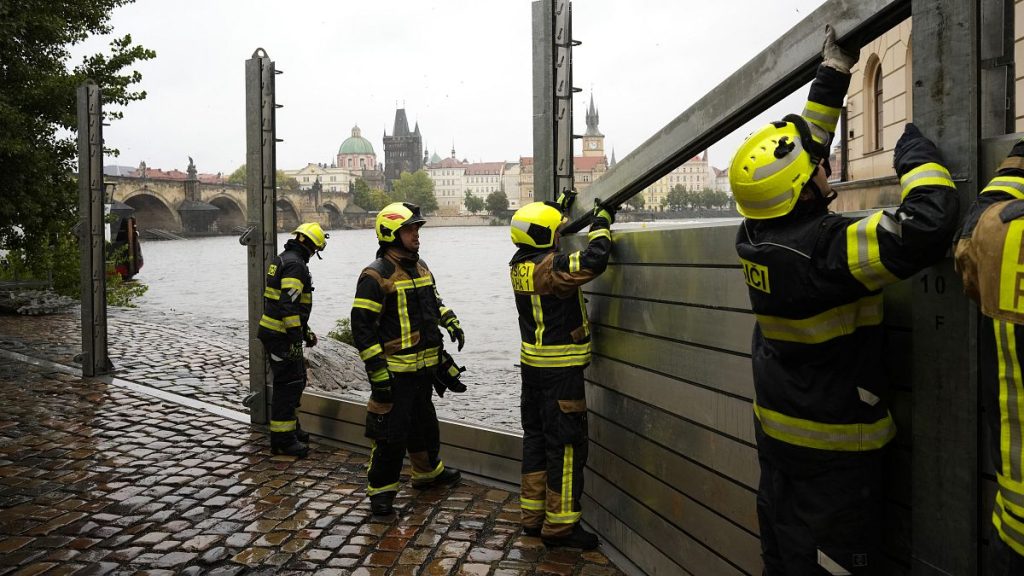Central European countries are facing severe flooding as a result of a low-pressure system from northern Italy that is predicted to dump heavy rainfall throughout the region. The Czech Republic, Poland, Austria, Germany, Slovakia, and Hungary are all bracing for the impact, with Czech authorities taking precautionary measures by erecting metal barriers and releasing water from dams to make room in reservoirs. Residents have been warned to prepare for possible evacuations, while some public events have been cancelled at the request of authorities. The forecasted heavy rainfall has raised concerns as experts have drawn parallels to the devastating floods of 1997, which claimed over 100 lives and caused significant damage.
In the Czech Republic, particularly in the eastern half of the country, the Jeseniky mountains and the city of Brno are at high risk for flooding as they lack proper protection measures unlike Prague. Czechs have been advised to avoid parks and woods due to forecasted high winds. Poland and Austria are also preparing for heavy rains and a cold front that is expected to bring snow to higher elevations. Prime Minister Donald Tusk of Poland reassured residents that while the forecasts were concerning, there was no need to panic, but urged everyone to be fully mobilized. The German Weather Service has warned of heavy precipitation across the country, including the Alps where snowfall and strong winds are expected at higher altitudes.
The change in weather comes after a hot start to September in the region and follows a record-breaking summer, which was declared the Earth’s hottest on record. The hotter atmosphere, driven by climate change, can lead to more intense rainfall, increasing the risk of extreme weather events such as the severe flooding currently being experienced in Central Europe. Officials in the affected countries have emphasized the importance of preparedness and ensuring that necessary investments in flood protection have been made. The lessons learned from previous flooding incidents in 2002 and 2013 have prompted governments to implement various projects and data analysis to mitigate the impact of natural disasters.
The Czech Republic, Austria, Germany, and other countries in Central Europe are on high alert as they face the threat of severe flooding due to the expected heavy rainfall from a low-pressure system. The flooding forecast has led to the implementation of precautionary measures such as erecting barriers, releasing water from dams, and advising residents to prepare for possible evacuations. Public events have been cancelled, and residents in the affected regions have been urged to stock up on food and prepare for power outages. The possibility of intense rainfall is a cause for concern, particularly as experts draw comparisons to devastating floods in the past, which claimed numerous lives and caused widespread damage.
Despite the challenging weather conditions, officials in Central European countries are working diligently to ensure the safety and well-being of their residents. The severe flooding forecast has prompted various governments to take proactive measures, such as Czech authorities erecting metal barriers and releasing water from dams to alleviate the impact of heavy rainfall. Prime Minister Petr Fiala of the Czech Republic acknowledged the importance of being prepared for worst-case scenarios and emphasized the need for readiness in the face of the impending severe weather. The lessons learned from previous flooding incidents have informed the actions taken by governments to protect their citizens and infrastructure from the potential devastation caused by extreme weather events.
As Central European countries brace for the impact of severe flooding, the global phenomenon of climate change looms large as a driving factor behind the record-breaking temperatures that have led to more intense rainfall. The Earth’s hottest summer on record, coupled with the hotter atmosphere, has heightened the risk of extreme weather events such as the severe flooding currently being experienced in the region. The urgency of addressing climate change and its impact on weather patterns has never been more apparent, as officials and residents alike grapple with the consequences of a changing climate. The preventative measures and investments made in flood protection projects underscore the importance of proactive planning and readiness in the face of increasingly unpredictable weather conditions.


